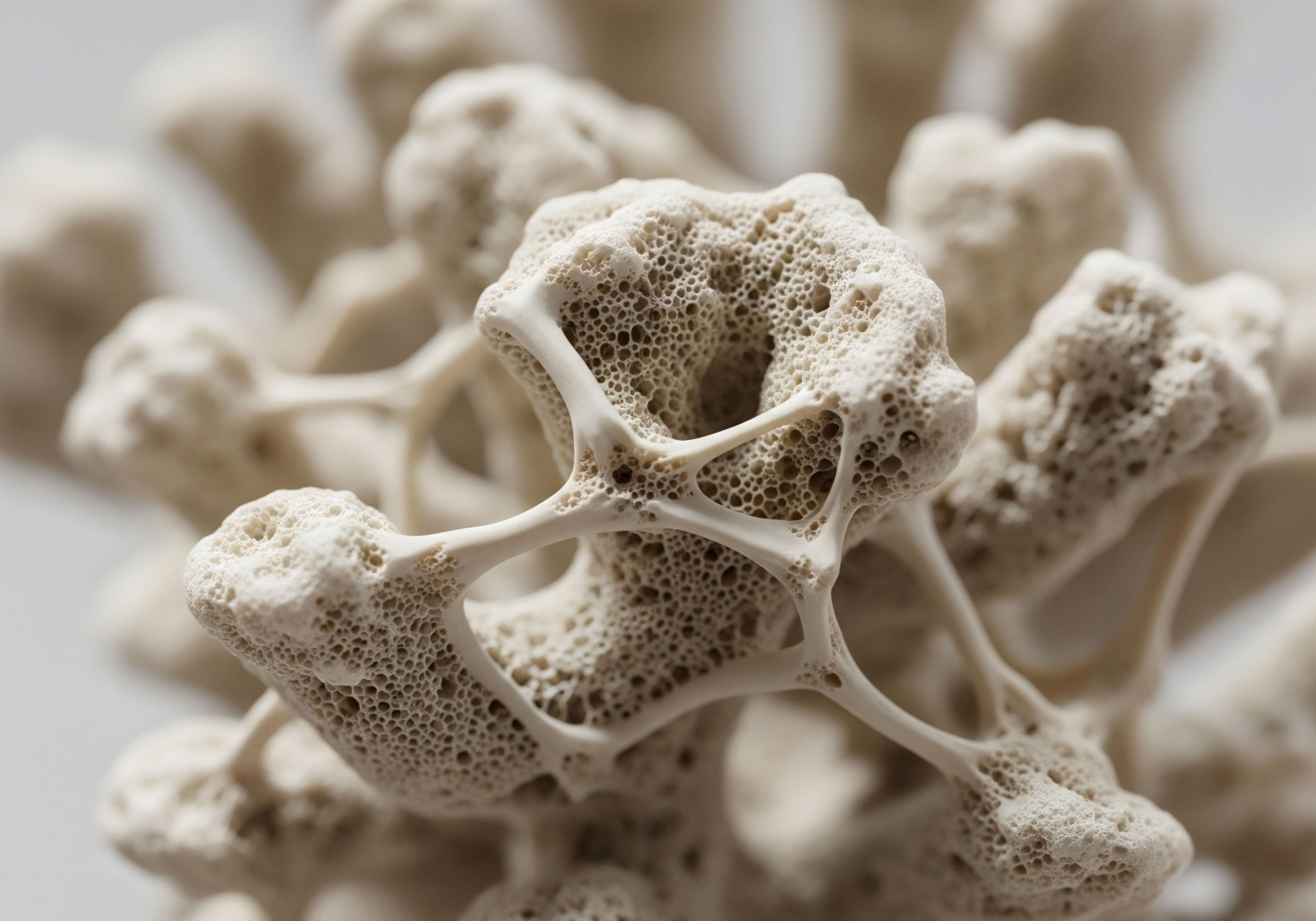

The Unraveling of Cognitive Precision
The insidious creep of age-related mental fog is not an inevitable decline but a signal of systemic recalibration ∞ or more accurately, a miscalibration. It is the body’s complex biological architecture communicating a need for adjustment. Understanding the foundational ‘why’ is paramount to reclaiming the sharp, decisive cognitive function that defines peak performance and vitality. This phenomenon arises from a confluence of biological shifts, primarily driven by hormonal fluctuations, metabolic inefficiencies, and escalating neuroinflammatory processes.

Hormonal Cascade Disruptions
Central to cognitive vitality is the intricate endocrine system. As individuals advance through life stages, the natural ebb and flow of key hormones become less optimal. Testosterone, vital for both men and women, governs executive function, drive, and mental clarity. Its decline is directly correlated with diminished processing speed and impaired decision-making capabilities.
Similarly, estrogen, critical for female neuroendocrine health, plays a profound role in memory consolidation and cognitive flexibility. Insufficient estrogen levels post-menopause can precipitate noticeable deficits in these areas. Furthermore, thyroid hormones act as master regulators of metabolism, directly influencing brain energy utilization and neurotransmitter synthesis.
Suboptimal thyroid function, whether overt hypothyroidism or subtle dysregulation, manifests as pervasive cognitive sluggishness and memory lapses. The persistent presence of elevated cortisol, often a byproduct of chronic stress, actively degrades hippocampal tissue ∞ the brain’s critical center for learning and memory.

Metabolic Stagnation and Brain Energetics
The brain is an energy-intensive organ, demanding a consistent and efficient supply of glucose and oxygen. Age-related shifts frequently lead to metabolic stagnation, characterized by reduced insulin sensitivity and mitochondrial dysfunction. Insulin resistance impairs the brain’s ability to effectively uptake glucose, its primary fuel source.
This creates an energy deficit, leading to reduced neuronal firing and cognitive fatigue. Mitochondria, the cellular powerhouses, become less efficient with age, generating fewer ATP molecules and producing more damaging reactive oxygen species. This compromised energy production and increased oxidative stress create a fertile ground for cognitive impairment.

The Inflammaging Cascade
A pervasive theme in aging is ‘inflammaging’ ∞ a chronic, low-grade systemic inflammation. This persistent inflammatory state is not confined to peripheral tissues; it actively infiltrates the central nervous system. Pro-inflammatory cytokines cross the blood-brain barrier, disrupting synaptic plasticity, impairing neurotransmitter function, and damaging neuronal structures. This neuroinflammation is a significant contributor to the ‘foggy’ sensation, as it hinders efficient neural communication and information processing.

Neurochemical Imbalances and Synaptic Dysfunction
The symphony of neurotransmitters ∞ dopamine, serotonin, acetylcholine, norepinephrine ∞ orchestrates our focus, mood, motivation, and memory. Age-related hormonal and metabolic changes can lead to imbalances in these critical chemical messengers. A reduction in dopamine, for instance, impacts motivation and executive control. Declines in acetylcholine are linked to memory deficits. These neurochemical shifts, coupled with reduced synaptic plasticity (the brain’s ability to form new connections), create a suboptimal environment for cognitive performance.


Engineering Neural Command and Control
Conquering age-related mental fog requires a deliberate, systems-engineering approach to biological optimization. This is not about passive management but active recalibration of the body’s core operating systems. The strategy involves a precise, data-informed application of hormonal support, advanced peptide science, metabolic conditioning, targeted nutrient delivery, and sophisticated lifestyle protocols. Each intervention is designed to reinforce neural integrity and enhance cognitive throughput.

Hormonal Recalibration
Restoring hormonal balance is a foundational strategy. For men and women experiencing hypogonadism, testosterone replacement therapy (TRT) offers a potent means to restore executive function, mood stability, and mental energy. Clinical evidence supports TRT’s efficacy in improving specific cognitive domains in hypogonadal individuals.
Similarly, judicious estrogen and progesterone optimization in women can mitigate menopausal cognitive deficits, supporting memory and processing speed. Ensuring euthyroid status, with thyroid hormones operating within optimal physiological ranges, is non-negotiable for cognitive clarity. The strategic management of cortisol, employing adaptogens and stress-reduction techniques, protects the hippocampus from degenerative effects.

Peptide Protocols for Cellular Intelligence
Peptide science represents a frontier in biological optimization, offering targeted signals to cellular machinery. For cognitive enhancement and neuroprotection, specific peptides are deployed with precision.
- Growth Hormone Secretagogues (GHSs) & GHRH Analogs: Compounds like Ipamorelin, CJC-1295, or Sermorelin stimulate endogenous growth hormone release. Optimized GH levels support cellular repair, metabolic function, and can indirectly bolster cognitive health through improved systemic vitality.
- BPC-157: This peptide, derived from a human gastric protein, exhibits remarkable tissue repair and anti-inflammatory properties. Preclinical research indicates neuroprotective potential, suggesting it can mitigate damage from neuroinflammation and oxidative stress, thereby supporting neural integrity.
- Cerebrolysin: A complex mixture of biologically active peptides and amino acids derived from porcine brain tissue, Cerebrolysin has demonstrated efficacy in improving cognitive function and daily living activities in various neurological conditions. Its mechanism involves neurotrophic support, antioxidant effects, and modulation of neurotransmission.
- GLP-1 Receptor Agonists (e.g. Semaglutide): While primarily metabolic agents, GLP-1 RAs are gaining attention for their neuroprotective properties. Their presence in brain tissue and influence on glucose metabolism suggest a role in supporting neuronal health and potentially mitigating neurodegenerative processes.

Metabolic Conditioning for Brain Fuel
Optimizing the brain’s fuel supply is critical. Implementing strategies that enhance insulin sensitivity and mitochondrial efficiency directly translates to improved cognitive performance.

Metabolic Interventions
- Nutrient Timing and Composition: Macronutrient ratios that prioritize healthy fats and proteins, coupled with controlled carbohydrate intake, stabilize blood glucose levels.
- Intermittent Fasting (IF) & Time-Restricted Eating (TRE): Protocols like 16/8 fasting or periodic 24-hour fasts promote cellular repair via autophagy, improve insulin sensitivity, and enhance mitochondrial biogenesis, all of which benefit brain function.
- Ketogenic Diets: Shifting the body’s primary fuel source to ketones provides an alternative, highly efficient energy substrate for the brain, often leading to enhanced mental clarity and focus.
- High-Intensity Interval Training (HIIT) & Strength Training: These exercise modalities robustly improve insulin sensitivity, boost mitochondrial density, and stimulate the release of neurotrophic factors like BDNF (Brain-Derived Neurotrophic Factor), which supports neuronal growth and survival.

Nutrient Engineering for Neural Architecture
The brain’s structure and function are profoundly influenced by nutrient availability. A targeted approach ensures the body possesses the essential building blocks and cofactors for optimal neural operations.
- Omega-3 Fatty Acids (EPA/DHA): Integral components of neuronal cell membranes, EPA and DHA are crucial for maintaining membrane fluidity, reducing inflammation, and supporting synaptic function.
- B Vitamins (B6, B12, Folate): Essential for neurotransmitter synthesis, DNA repair, and homocysteine metabolism. Elevated homocysteine is a risk factor for cognitive decline.
- Vitamin D: Receptors are widespread in the brain, indicating a significant role in neuroprotection, immune modulation, and neurotransmission.
- Magnesium: Plays a role in over 300 enzymatic reactions, including those critical for learning, memory, and nerve signal transmission. Specific forms like Magnesium L-Threonate demonstrate enhanced brain penetration.
- Antioxidant Support: Compounds like N-acetylcysteine (NAC), CoQ10, and various phytonutrients combat oxidative stress, a key contributor to age-related cognitive decline.

Cognitive Resilience Practices
Beyond biochemical interventions, cultivating mental resilience through lifestyle practices reinforces cognitive capacity.
- Optimized Sleep Architecture: Achieving 7-9 hours of quality sleep is non-negotiable. This period is vital for memory consolidation, waste clearance (glymphatic system), and hormonal regulation. Implementing strict sleep hygiene protocols is paramount.
- Mindfulness and Stress Modulation: Regular meditation and breathwork practices reduce cortisol levels, enhance focus, and improve emotional regulation, thereby safeguarding cognitive function.
- Strategic Nootropic Application: Certain nootropics, when used judiciously and as adjuncts to foundational protocols, can support cognitive processes. Examples include Alpha-GPC for choline supply, L-Theanine for calm focus, and Bacopa Monnieri for memory enhancement, all supported by clinical data.
Clinical trials demonstrate that optimizing testosterone levels in hypogonadal men can lead to significant improvements in executive function and cognitive processing speed.


The Chronometry of Intervention
The precise timing and sequencing of interventions are as critical as the interventions themselves. Recognizing the subtle indicators of cognitive drift and employing a phased, diagnostic-driven approach ensures maximum efficacy and minimizes unnecessary biological disruption. This is about strategic application, not indiscriminate deployment of therapies.

Identifying the Indicators of Cognitive Drift
Mental fog is rarely a sudden onset; it is an insidious erosion. Key indicators include ∞
- Persistent difficulty concentrating or maintaining focus.
- Increased frequency of forgetting words or details.
- Reduced mental stamina during demanding tasks.
- A general feeling of mental sluggishness or ‘brain static’.
- Slower recall of information or names.
- Decreased problem-solving efficiency.

The Diagnostic Imperative
Objective assessment forms the bedrock of effective intervention. Before initiating any advanced protocols, a comprehensive diagnostic panel is essential. This includes ∞

Core Biomarker Assessment
- Hormonal Profile: Full endocrine panel including Total and Free Testosterone, Estradiol, Progesterone, SHBG, LH, FSH, DHEA-S, and Cortisol (diurnal pattern if possible). Thyroid panel (TSH, Free T4, Free T3).
- Metabolic Markers: Fasting Glucose, HbA1c, Lipid Panel (Total Cholesterol, LDL, HDL, Triglycerides), hs-CRP (high-sensitivity C-reactive protein) for inflammation.
- Nutritional Status: Vitamin D levels, Vitamin B12, Folate, Magnesium, Omega-3 Index.
- Optional Cognitive Screening: Standardized cognitive tests can provide objective baseline data.
This data provides a precise blueprint of the individual’s biological state, highlighting specific areas requiring attention.

Phased Implementation Strategy
The application of interventions follows a logical hierarchy, prioritizing foundational elements before advancing to more complex therapies.

Phase 1 ∞ Foundational Optimization (immediate Action)
- Sleep Hygiene: Establish a consistent, high-quality sleep routine.
- Nutrient-Dense Diet: Implement a whole-foods, anti-inflammatory diet. Ensure adequate intake of micronutrients identified as deficient.
- Movement Protocols: Integrate regular cardiovascular exercise, strength training, and mobility work.
- Stress Management: Incorporate daily mindfulness or meditation practices.
These lifestyle adjustments form the indispensable bedrock upon which all other optimizations are built.

Phase 2 ∞ Targeted Biochemical Support (based on Diagnostics)
Once foundational elements are established, diagnostic results guide the introduction of specific biochemical interventions.
- Hormonal Therapy: If diagnostics reveal significant deficiencies (e.g. hypogonadism, hypothyroidism), TRT, estrogen/progesterone replacement, or thyroid hormone optimization may be initiated under medical supervision.
- Metabolic Adjustments: If insulin resistance is present, strategies like intermittent fasting or a ketogenic approach may be intensified.
- Supplementation: Targeted supplementation based on identified deficiencies (e.g. Omega-3s, Magnesium L-Threonate, B vitamins).

Phase 3 ∞ Advanced Optimization Protocols (for Specific Goals)
For individuals seeking peak performance and accelerated cognitive restoration, advanced protocols are considered.
- Peptide Therapy: Introduction of peptides like BPC-157 for systemic repair, or growth hormone secretagogues for metabolic and cellular rejuvenation, based on individual needs and therapeutic goals. Cerebrolysin may be considered for specific cognitive enhancement objectives under expert guidance.
- Strategic Nootropics: Fine-tuning cognitive function with well-researched nootropic agents, always integrated with foundational protocols.
The ‘when’ is dictated by objective data and a progressive, integrated strategy. Early intervention based on diagnostics yields superior outcomes.

Mastery of the Evolving Mind
Age-related mental fog is not a decree of fate but a solvable equation within the intricate biological system of the human body. The ‘Vitality Architect’ perspective views the mind and body as a high-performance machine, capable of continuous refinement and optimization.
By understanding the deep-seated biological drivers ∞ the hormonal recalibrations, the metabolic efficiencies, the inflammatory signals ∞ and by deploying precise, evidence-based interventions, individuals can transcend the limitations imposed by time. This journey is one of proactive self-mastery, where data-driven strategies and advanced biological tools converge to unlock enduring cognitive acuity and a life lived at peak potential. The architecture of a sharp, resilient mind is within reach for those who commit to intelligent design and strategic execution.

Glossary

cognitive function

peak performance

insulin sensitivity

neuroinflammation

peptide science

mental fog

trt




